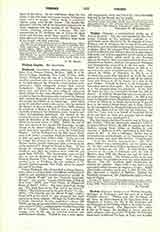

Thebaud, Augustus, Jesuit educator, and publicist, b. at Nantes, France, November 20, 1807; d. at St. John’s College, Fordham, New York, December 17, 1885. Father Thebaud was the son of a worthy but not wealthy merchant who was married to his pious wife in the dark days of the Terror by a loyal priest, a circumstance which eloquently proves their earnest Catholicity. Their children were brought up with great care and given the best religious education which France at that time afforded. Young Thebaud studied at first in the preparatory seminary at Nantes, then entered the grand seminaire and was ordained to the secular priesthood at the usual age. After three years of parochial work in his native city, he entered the Society of Jesus in Italy, on November 27, 1835, whence he returned to France in 1837 to pursue a course of scientific studies at the Sorbonne under Ampere and other distinguished professors. He landed in the United States on December 18, 1838, and was called to the chair of chemistry at St. Mary’s College, Kentucky, where he became rector in 1846. Before the end of that year however the Jesuits left Kentucky to take charge of St. John’s College, Fordham, New York, which had been transferred to them by Archbishop Hughes. Father Thebaud was the first Jesuit President of St. John’s, a position which he held from 1846 to 1851 and again from 1860 to 1863. In the interval he taught the sciences for two years, 1851-52, under Father Larkin, and the following eight years he spent as the pastor of St. Joseph‘s Church at Troy. To this charge he returned after his second rectorship at Fordham and filled the position from 1863-69, and again from 1873-74. The intervening years we find him at first in Montreal and then at St. Joseph‘s Church, Hudson City, New Jersey. After spending another year at Fordham, he was assigned to St. Francis Xavier’s parish, New York, where he passed the rest of his days.
Father Thebaud, who always had a strong literary bent, wrote a series of books on religious and historical subjects and published, besides numerous articles in the “Catholic World” and the “Catholic Quarterly Review”, two novels, “Louisa Kirkbridge, A Tale of New York” (1879), and “Twit Twats, An Allegorical Story of Birds” (1881). His more important works are: “The Irish Race in the Past and in the Present” (1873); “The Church and the Gentile World” (2 vols., 1878); “The Church and the Moral World” (1881). From 1875 to his death, he also prepared his reminiscences in three volumes. Of these the United States Catholic Historical Society published volume III (1904), giving an account of his American experiences, and volume I (1911), containing the recollections of his life in France. Father Thebaud was a man full of energy, even in old age, an untiring student, and well-informed scholar. Withal he was a most agreeable companion, witty and full of life, and universally beloved by his friends and his pupils.
CHARLES G. HERBERMANN

